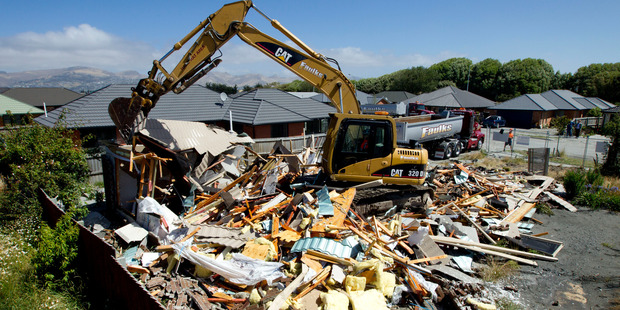 Wages in the construction industry in Canterbury have gone up more than 25 per cent since 2011. Photo / Simon Baker
Wages in the construction industry in Canterbury have gone up more than 25 per cent since 2011. Photo / Simon BakerSubdivisions have multiplied, with almost 15,000 new homes in Christchurch consented since January 2011, together worth more than $4.6 billion.
Average costs of the new build increase in dollar terms are not held. But in the past five years, the average home in Christchurch city has risen by more than $120,000.
Statistics NZ surveys builders about the cost of construction materials, labour and total build prices, to calculate the cost of building.

Canterbury Registered Master Builders president Alastair Miles said a lot of the increase was in extra health and safety and compliance costs.
A rule change in 2012 means scaffolding and safety netting must be used for even small, single-storey homes, which he said usually added about $5000-$15,000 per home, and could add delays.
"All the emphasis on health and safety is a good thing, but it inflicts a lot of extra cost on construction," he said.
The rules around foundations were also stricter, which he said could cost about $5000-$10,000 for a house on good land, and anywhere up to $100,000 on badly earthquake-damaged land.
The boom in work had meant there was a lot more demand for good workers, which had pushed up the cost of labour substantially almost overnight, he said.
According to Statistics New Zealand, wages in the construction industry in Canterbury have gone up more than 25 per cent since 2011. The planning costs had also gone up, as Mr Miles said the process of putting plans through the city council had once cost about $1000, but could now cost about $5000.
"It's not builders pilfering the system or taking advantage. There are a lot of builders working extremely hard who won't make money."
Because of the demand for labour, many new builders had to hire less skilled workers, which often meant mistakes were made and had to be fixed, he said.
Although some tradespeople were driving big new trucks, that did not necessarily reflect big profits, he said.
He said those who had not prepared for the rise in expenses were now struggling.
Many of the flash new trucks were leased, and had been repossessed as businesses had gone under, he said.
"There are a lot of builders who aren't great at using their money wisely, and when they see a positive cashflow they spend it. So it's not actually a reflection potentially of them making money, they're just confident of a good work stream and go and splash out."
Builders who were doing well were making a profit because they were taking on more volume of work, not because their margins had gone up, he said.
As the residential rebuild work plateaued, he expected building prices to drop slightly, although many of the increased costs would stay the same.
"As the market quietens you're going to get more people competing for less work, so you will probably see potential dropping of rates. We are seeing that now with trades like painters, Gib-stoppers, bricklayers, tilers. We're getting cheaper rates coming through."
http://www.nzherald.co.nz/business/news/article.cfm?c_id=3&objectid=11674669
No comments :
Post a Comment